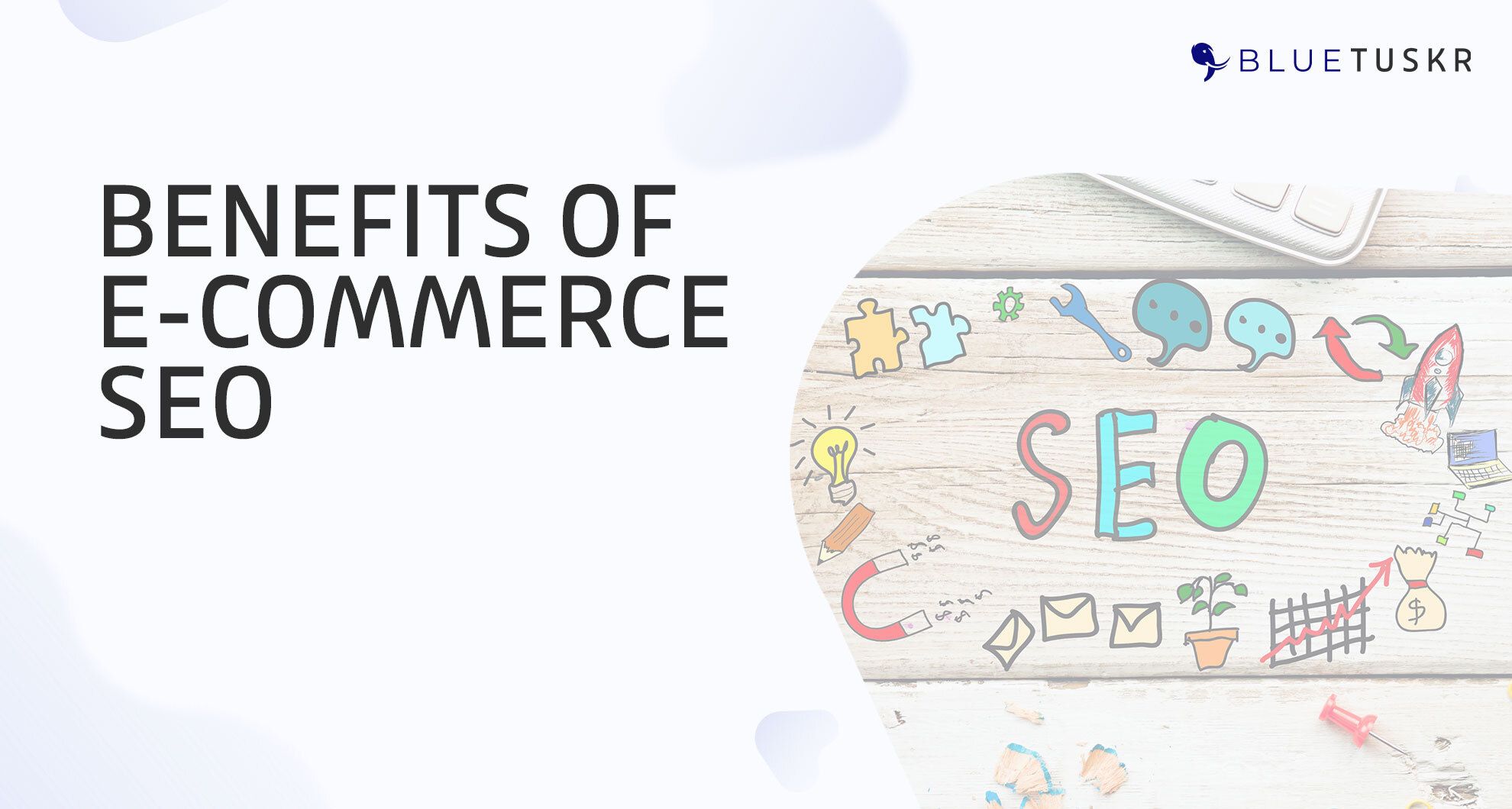
7 Benefits of SEO for E-commerce Sellers
Have you ever wondered why some online stores seem to be everywhere you look? The secret is ecommerce search engine optimization (SEO). It's like a magic wand that can boost your online store's visibility, drive loads of organic traffic down your marketing funnel, and skyrocket your sales.
Intrigued? Buckle up because we're about to take you on a fun and enlightening ride through the world of SEO and its fantastic benefits for ecommerce businesses.
Why SEO is a Game-Changer in the E-commerce World
In the fast-paced world of e-commerce, standing out can be a challenge. With countless online stores vying for attention, how do you make sure yours gets noticed? Enter SEO.
There are several benefits associated with e-commerce SEO, including better visibility on Google, increased site usability (and thus conversion rates), faster page load speeds, and more positive sentiment from users who stumble upon your products, thanks to an improved organic ranking position.
According to Neil Patel, ecommerce websites that secure the top spot in search engine results capture the most traffic, approximately 20.5%. This means you can expect to double your website's daily visitors as soon as your products start showing up on search engine users' search results pages!
And it all leads to one thing... conversions (aka CUSTOMERS!). Here are 7 benefits of ecommerce SEO:
1. Increased Visibility and Organic Traffic
Imagine having a store in a bustling market where everyone can see you. That's what an ecommerce SEO strategy does for your online store. By optimizing your site with relevant keywords, meta tags, and quality content, you can improve your rankings (shoutout to keyword research- read about it here). In other words, the higher you rank, the more visible you become and the more organic traffic you attract.
AKA... more sales.
And the best part? Organic traffic is free! Unlike paid ads, which can burn a hole in your pocket, SEO lets you attract visitors without spending a dime. It's a win-win!
Research shows that fewer than 50% of consumers make it past the first web page when searching for local services or products online—meaning your online business can lose almost half of its potential customers right off the bat. On the first page alone, the top five organic results receive 67.60% of all clicks.

2. Enhanced User Experience and Site Usability
Ever visited a website that took ages to load or was impossible to navigate? Frustrating, right? Well, SEO can help you avoid that. By optimizing your site's structure, loading speed, and mobile-friendliness, you can create a smooth and enjoyable user experience.
When users can easily find what they're looking for, they're more likely to stick around and make a purchase. Plus, search engines love user-friendly ecommerce sites, which means better rankings for you. It's like killing two birds with one stone!
But it doesn't stop there. A well-optimized site also reduces bounce rates and increases the time users spend on your site, both of which can positively impact your SEO rankings. Happy users, happy search engines!
3. Cost-Effectiveness and High ROI
Let's talk money. Running an online store isn't cheap, and marketing costs can quickly add up. But here's the good news—SEO is one of the most cost-effective marketing strategies out there. While it requires an initial investment of time and effort, the long-term benefits far outweigh the costs.
Unlike paid ads, which stop driving traffic as soon as you stop paying, SEO continues to attract visitors over time. It's like planting a tree that keeps bearing fruit year after year. With a higher return on investment (ROI) compared to many other marketing channels, SEO is a smart choice for budget-conscious e-commerce sellers.
4. Targeted Traffic and Qualified Leads
One of the biggest challenges in e-commerce is reaching the right audience. After all, what's the point of attracting visitors if they have no interest in buying your products? That's where SEO comes in. By targeting specific keywords related to your products, you can attract visitors who are actively looking for what you offer.
This means more qualified leads and higher conversion rates. Imagine having a store full of people who are genuinely interested in your products. Sounds like a dream come true, right? Well, that's the power of SEO.
And it gets even better. With local SEO, you can target customers in specific geographic areas, making it easier to reach your local audience. Whether you're a global ecommerce store or a local ecommerce business, SEO can help you connect with the right people at the right time.
5. Competitive Advantage
In the cutthroat world of e-commerce, staying ahead of the competition is crucial. With so many online stores vying for attention, how do you stand out? The answer is simple—SEO. By optimizing your site and staying up-to-date with the latest SEO trends and best practices, you can gain a competitive edge.
Think of it as a race. While your competitors are stuck in traffic, you have a clear path to the finish line. With better visibility, targeted traffic, and a user-friendly site, you can attract more customers and leave your competitors in the dust.
And remember, SEO is an ongoing process. By continuously optimizing your site and adapting to changes in search engine algorithms, you can maintain your competitive advantage and stay ahead of the game.
6. Long-Term Credibility and Brand Authority
Building trust and credibility is essential for any business, and e-commerce is no exception. When users see your site ranking high on search engine results, it signals that you're a reputable and trustworthy brand. And the more credible you are, the more likely customers are to buy from you.
In fact, users are 85% more likely to buy something from an ecommerce site if it's listed on page one in the search results. According to Kissmetrics, if you can boost your e-commerce website's conversion rates by even just five percent, it could increase sales revenue by 25% or more.
SEO helps you build this credibility and brand authority over time. By consistently providing valuable content, optimizing your site, and earning backlinks from reputable sources, you can establish yourself as an authority in your niche.
And guess what? Credibility and authority also boost your search engine rankings. It's a virtuous cycle where better rankings lead to more trust, and more trust leads to better rankings. It's all about building a strong foundation for long-term success.
7. Insights into Customer Behavior and Market Trends
Knowledge is power, and SEO gives you a treasure trove of insights into customer behavior and market trends. As previously mentioned, tools like Google Analytics can track keywords, monitor user behavior, and analyze traffic patterns. This valuable data can help you understand what your customers are looking for, what they're interested in, and how they interact with your ecommerce site.
Armed with these insights, you can make informed decisions and fine-tune your marketing strategies. Whether it's optimizing your product descriptions, creating targeted content, or identifying new market opportunities, SEO provides the information you need to stay ahead of the curve.
And the best part? These insights aren't just useful for SEO—they can benefit every aspect of your business. From product development to customer service, understanding your audience is the key to success.

FAQs
Q: Why should I work with an agency like BlueTuskr for SEO optimization?
A: While it is possible to optimize your site for SEO on your own, working with a knowledgeable and experienced agency like Bluetuskr can greatly enhance the effectiveness of your efforts.
Agencies have access to cutting-edge tools and techniques, as well as a deep understanding of search engine algorithms. This allows them to create a comprehensive and strategic approach to optimizing your site for maximum visibility and results.
Q: Isn't SEO expensive?
A: Compared to other marketing strategies, SEO is actually one of the most cost-effective options available. While some initial investment may be required, the long-term benefits far outweigh the costs. Plus, with a higher ROI compared to many other marketing channels, SEO is a smart choice for budget-conscious e-commerce sellers.
Q: How long does it take to see results from SEO?
A: SEO is not a quick-fix solution. It takes time and consistent effort to see significant results. However, once your site starts ranking higher and attracting targeted traffic, the benefits can be long-lasting. With tools like Google Analytics, you can track your progress and see how your efforts are paying off over time.
Q: Can't I just buy ads instead of investing in SEO?
A: While paid advertising can certainly drive traffic to your site, it is a short-term solution that requires continuous investment. In contrast, the effects of SEO are long-lasting and can continue to bring in organic traffic over time without the need for ongoing payments.
Additionally, with SEO, you have the potential to rank higher and attract more targeted traffic than with ads alone. It's a smart investment for long-term success.
Ready to Boost Your E-commerce Business with SEO?
SEO isn't just a buzzword; it's a powerful tool that can transform your e-commerce business. From increased visibility and organic traffic to enhanced user experience and long-term credibility, the benefits are truly endless. So why wait? Start optimizing your site today and watch your business grow.
And if you need a helping hand, don't hesitate to contact our team at Bluetuskr, an e-commerce marketing agency. Our team of e-commerce SEO experts are here to guide you every step of the way.
Connect With Us
Recent Post

.png)







Tell us what you think!